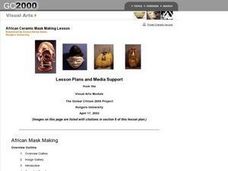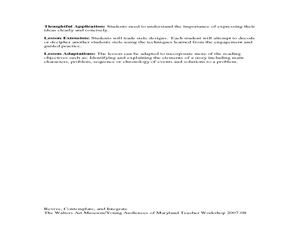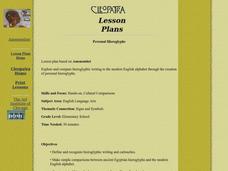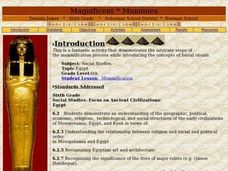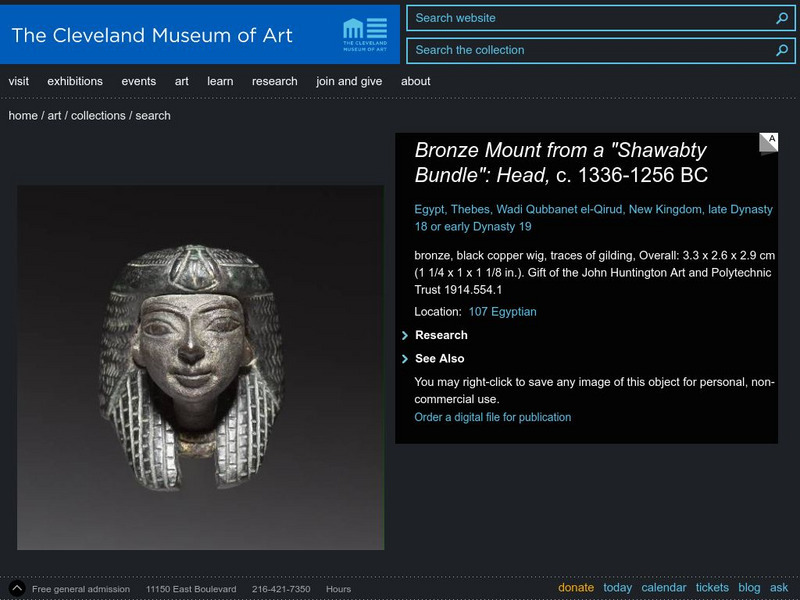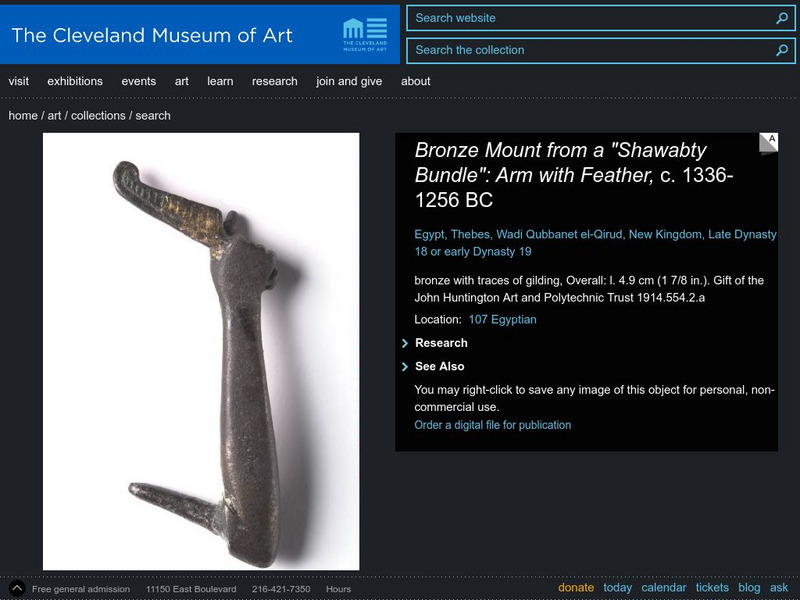Curated OER
Art of Ancient Civilizations
By studying the art of ancient civilizations, students can learn about the history and traditions of different cultures.
Curated OER
African Ceramic Mask Making
Students investigate a variety of African mask types, design several masks, and create an example of an African ceramic mask in this 5th grade through High School Art lesson. The lesson can take anywhere from 6 lessons to 16 lessons.
Curated OER
Egyptian Symbols: What story do they tell?
Students create a stele to represent what symbols are the most important to them. In this symbols lesson plan, students learn about Egyptian symbols, and then put their own important symbols into model magic clay according to their size...
Curated OER
Personal Hieroglyphs
Students explore and compare hieroglyphic writing to the modern English alphabet through the creation of personal hieroglyphs.
Curated OER
Journey to the Afterlife
Students work together to design an Egyptian funerary barge. They discover the importance of the afterlife to Egyptians. They create their boat and share their design with the class. They compare and contrast the technology of Ancient...
Curated OER
Meet a Creature From Ancient China
Students view an image of a Chinese chimera and complete a chart describing what they see and understand about the creature. They compare funerary customs today to those of ancient China. They compile a list of items that might be...
Curated OER
Magnificent Mummies
Sixth graders create paper mache mummies out of foil/balloon and paper, thus learning about one of the steps in the process of mummification. They study the importance of mummification, the rituals in handling the dead, and the process...
Curated OER
Treasures of Ancient Egypt
Students explore Ancient Egypt by learning about the after life, observing and discussing pictures of mummies, making jewelry, and more. In this Ancient Egypt lesson plan, students complete these activities in class and at a museum.
Curated OER
Masks and More Masks
Students study different cultures through their masking traditions. They experiment with a variety of mask making media. They explore the elements of 3-D to encourage creativity.
ArtLex
Art Lex: Roman Art
Artlex.com surveys Roman art and artists with text and illustrated examples. Features include links to related terms, concepts, art examples, and the like.
Cleveland Museum of Art
Cleveland Museum of Art: Shawabty Bundle": Arm With Scribe's Palette
This Bronze Mount from a "Shawabty Bundle": Arm with Scribe's Palette, c. 1336-1256 BC is a funerary figure from Egypt, Thebes, Wadi Qubbanet el-Qirud, New Kingdom, Late Dynasty 18 or early Dynasty 19.
Cleveland Museum of Art
Cleveland Museum of Art: Bronze Mount From a "Shawabty Bundle": Head
This Bronze Mount from a "Shawabty Bundle": Head, c. 1336-1256 BC comes from Egypt, Thebes, Wadi Qubbanet el-Qirud, New Kingdom, late Dynasty 18 or early Dynasty 19.
Tech4Learning
Pics4 Learning: Images for Education: Tombs
A large selection of photos from tombs, memorials and mausoleums. This site is a fantastic visual reference for a history or art class. Simply click on an photo to view the larger image.
Cleveland Museum of Art
Cleveland Museum of Art: Bronze Mount From a "Shawabty Bundle": Arm With Feather
This Bronze mount from a "Shawabty Bundle": Arm with Feather, c. 1336-1256 BC comes from Egypt, Thebes, Wadi Qubbanet el-Qirud, New Kingdom, Late Dynasty 18 or early Dynasty 19.
Art Institute of Chicago
Art Institute of Chicago: Attic Funerary Stele, or Tombstone
Examine a carved marble tombstone used by the Greeks to mark the graves of departed family members. Also, view two accompanying video clips that provide useful background information about the sculpture's particulars. One explains the...
Khan Academy
Khan Academy: Haniwa Warrior
We don't know much about haniwa or the Kofun Period because there was no writing system in Japan at the time. What we do know is that instead of being buried deep underground with the deceased, haniwa occupied and marked the open...
Khan Academy
Khan Academy: Haniwa in the Form of a Warrior
This object is a haniwa (lit. "clay ring"), a type of funerary article made during the Kofun era (300-552). Many kinds of haniwa have been found, including both simple clay cylinders and more elaborate forms, such as human figures,...
Khan Academy
Khan Academy: Tomb of the Triclinium
Funerary artifacts constitute the most abundant archaeological evidence for the Etruscan civilization. Read a description and view pictures of The Tomb of the Triclinium, an Etruscan chamber tomb, in this article.
Khan Academy
Khan Academy: Sarcophagus of the Spouses (Rome)
The Sarcophagus of the Spouses is a masterwork of terracotta sculpture and conveys a great deal of information about Etruscan culture and its customs, especially funeral customs. View pictures and read descriptions of the sarcophagus in...
Khan Academy
Khan Academy: Paintings From the Tomb Chapel of Nebamun
The fragments from the wall painting in the tomb-chapel of Nebamun are keenly observed vignettes of Nebamun and his family enjoying both work and play. Some concern the provision of the funerary cult that was celebrated in the...
Curated OER
Web Gallery of Art: Funerary Monument to Sir John Hawkwood
An image of "Funerary Monument to Sir John Hawkwood", created by Paolo Uccello in 1436 (Fresco, 820 x 515 cm).
Curated OER
Web Gallery of Art: Study for a Funerary Monument
An image of "Study for a Funerary Monument", created by Karl Blechen from 1824-27 (Oil on board over wood, 14 x 23 cm).
Curated OER
Web Gallery of Art: Design for the Funerary Monument of Francesco Gonzaga
An image of "Design for the funerary monument of Francesco Gonzaga", created by Giovan Francesco Penni, c. 1519 (Brush, pen, and brown ink with white highlights over pierre noire, 507 x 272 mm).



